Will Lautzenheiser lost his arms and legs to a deadly bacteria. Now, transplant surgeons want to give them back. By Art Jahnke | Photos by Asia Kepka
In nightly dreams, Will Lautzenheiser still rolls out of bed in the morning and walks wherever his adventurous spirit takes him. He’s still a lanky guy, a graceful six-foot-two, with straight hair and a generous laugh that seems somehow at odds with his contemplative blue eyes.
In real life, Lautzenheiser doesn’t get out of bed, at least not without a great deal of help. And he hasn’t walked anywhere since last fall, when a group A streptococcus infection shut down his lungs, heart, and kidneys, then unleashed a toxin that brought death to his limbs. He told the surgeons at University Hospital in Salt Lake City to do what they had to do—he just wanted to live. Nine months later, the new Will Lautzenheiser, still handsome and still contemplative, but with stumps where his arms and legs used to be, has yet to appear in dreams. When he does, Lautzenheiser hopes he’ll be ready for him.
“I’m not angry,” says Lautzenheiser (CAS’96, COM’07), now 37. “I feel cheated and I feel robbed of a lot. But really, what am I supposed to be angry at? The microbes? I was vastly outnumbered, and they took me down. I can’t blame them for that.”
Lautzenheiser spent nearly 20 years on the BU campus, where he was an exceptional student and an extraordinary mentor. As a College of Communication master’s student in film (and later as a teacher), he wore a jacket to class and called his teachers “Professor.” His friends, who wore blue jeans and called their professors by their first names, never held it against him. They had too much respect for the older classmate who seemed to know everything and was always willing to help them.
“Will took academics very seriously,” says Peter McCann (COM’08), a former fellow student at COM. “He took responsibility for his own education very seriously. Will never did anything half-assed.”
Saul Bellow (Hon.’04), a friend and employer for five years until his death in 2005, labeled Lautzenheiser “a noticer,” an encomium the writer reserved for a special few. Lautzenheiser’s colleagues at COM recall a tireless mentor, a teacher who was never too busy to watch yet another cut of a student’s film.
He was attentive, but he was also demanding, Lautzenheiser says. “I always told them, ‘Why do something if you’re not going to do it as well as it can be done?’ I mean, isn’t that the point of doing anything?”
One evening in August 2011, Lautzenheiser was eating at an Indian restaurant in Boston when a strange, feverish chill rushed through his body. Two nights later, as he was moving a box of books, pain flared through his thigh. He wondered whether he had pulled a muscle. For the next two weeks, the pain came and went, more frequently and more piercingly as time went by. Lautzenheiser ordinarily took even minor ailments seriously, but that summer he had too much going on to worry about aches and pains. He was moving to Bozeman, Mont., where he had signed on to teach filmmaking at Montana State University. Bob Arnold, a former professor at COM and the new director of the School of Film and Photography at Montana State, considered recruiting the dedicated teacher a coup.
It was Arnold who gave Lautzenheiser a lift, 10 days after he arrived in Bozeman, to the local hospital so doctors could have a look at his leg. Lautzenheiser remembers walking into the hospital, and he remembers calling his twin brother, Tom, in Easthampton, Mass. Tom remembers the conversation: “He said, ‘I’ve been through the wringer.’ He said they were going to put him on a ventilator to give his lungs a rest. He gave me power of attorney, and told me to give my daughter a hug for him.”
Tom then spoke to Robert Schoene, an exercise physiologist and high-altitude medicine expert, who told him that the medical staff in Bozeman didn’t know what was causing his brother’s illness, but they did know that he was very sick. Tom asked if he should get on a plane, and the doctor said he should probably “just sit tight.” Tom thought he knew what that meant: “They expected Will to die.”
Tom Lautzenheiser did not sit tight. He flew to Montana the next day, and made his way to St. Vincent Healthcare in Billings, where Will had been transferred. When he walked into the ICU, he had to peer around a bank of medical machines to see his brother.
“The change was unspeakable,” he says. “Will had gained half again his body weight in fluids. He was hideously swollen. Even his eyes were swollen open. I bent down and said, ‘Will, you’re not alone.’ I think he moved his head a little. I think he knew I was there.” (Watch the video.)
Boys’ Life
Tom and Will Lautzenheiser had always been there for each other. The identical twins took turns sleeping on the upper and lower berths of a bunk bed during their childhood. “One of us would have the upper bunk for a while, then we’d switch, to be fair,” says Tom. The boys were part of the second family of Massachusetts state climatologist Robert Lautzenheiser, who was 59 when they were born. The twins looked alike, but thought differently. Tom was drawn to nature, fascinated by the frogs and turtles living in the ponds around their suburban town of Reading. Will liked stories. He read books and watched movies.
One day when the boys were in middle school, a camera crew arrived to film a segment on the importance of the Great Books. Because Will was one of the smart kids, he was chosen for on-camera comments. Then they brought in the camera.
“It was pure joy,” he remembers. “When I saw that camera all I could do was laugh. It was an immediate object of my love, and the very moment I saw it I knew that’s what I wanted to do.”
His teachers also knew what they wanted: a video undisturbed by giggles. Will’s first appearance on video was squelched by his irrepressible exuberance.
When he was 15, he saw Ingmar Bergman’s Wild Strawberries, the story of an elderly university professor contemplating the emptiness of a life that was closing in on itself—not the kind of film that would appeal to most teens. “I was blown away,” Will says.
By the time the Lautzenheiser boys got to Reading Memorial High School, there was no need for fraternal demonstrations of fairness, and Tom settled permanently in the bunk bed’s top berth. Now Massachusetts Audubon Society’s central and western regional scientist, Tom remained faithful to his love of the natural sciences, caring for the reptiles and amphibians at the high school’s animal care center. Will went deep into the arts. He was a dreamer and a reader and a devoted watcher of movies. Unlike many of his peers, he never understood the appeal of big-budget action films. He preferred small films, quiet stories about the extraordinary events of ordinary lives, films whose most powerful moments waited to be noticed.
Tom went to Tufts, and his brother entered the College of Arts & Sciences, where he studied English literature. He had always loved to read, and now he could read to his heart’s content, then talk about what he’d read with colleagues and professors, like Gerald Fitzgerald, a professor emeritus of English, who would become a close friend.
Saul Bellow “liked Will’s meditative side. Will had a great sense of propriety and dignity, as well as a fierce loyalty to Saul,” says Janis Freedman-Bellow.
In his sophomore year, Lautzenheiser took a job as a researcher at the University’s nowdefunct James Joyce Research Center, working under the direction of the famously eccentric John Kidd. Kidd, who dedicated a decade to correcting some 2,500 textual errors that he claimed had crept into Ulysses, never produced his promised definitive edition of the work, for which he had received a $100,000 advance.
Lautzenheiser graduated in 1996, summa cum laude, with distinction, Phi Beta Kappa, honors sufficient to earn a job as writer for Dennis Berkey, then the BU provost. “It was a good job,” recalls Lautzenheiser, “but the provost didn’t really need a writer. He was a perfectly good writer himself.”
Berkey helped him find another job, as secretary and personal assistant to someone with even less need for writing assistance. Pulitzer Prize winner and Nobel laureate Saul Bellow had come to BU in 1993, recruited by President John Silber (Hon.’95). When Lautzenheiser started working for him, Bellow was 84 years old and had just had a child with his fifth wife, Janis Freedman-Bellow. Lautzenheiser and Bellow, both readers and both noticers, hit it off.
“Saul liked Will’s quiet, meditative side,” Freedman-Bellow says. “He liked to talk with Will about books. Will had a great sense of propriety and dignity, as well as a fierce loyalty to Saul.”
Lautzenheiser would prepare meals for Bellow, she recalls, and he would take extraordinary care that everything would taste just right. “He was a real perfectionist,” she says. “It didn’t matter to Saul if the food was imperfect, but it did matter to Will.”
It was his affection for Bellow, says Lautzenheiser, and the opportunity to remain close to the wisest man he’d ever met that persuaded him to stay at Boston University for his graduate studies in film. In 2005, he entered COM, a bit older and better outfitted than most of his classmates.
Friend and former classmate Kerstin Karlhuber says Will stood out for reasons other than his manner of dress. “He was a real intellectual,” says Karlhuber (COM’07). “He had a lot knowledge in a lot of areas, so he brought a lot to our classes. I think I learned as much from Will as I did from my professors.”
For thesis film projects, COM students are required to work together in different roles, such as directing, lighting, and sound. “No matter what role Will took on, it was the most important thing to him,” Karlhuber says. “He was always going above and beyond to help me out. We all knew we could always lean on Will.”
McCann, now a production assistant on the TV show Bones, says Lautzenheiser was someone most students deferred to. “He was kind of a rock for us,” says McCann. “As well as practically being a card-carrying genius.”
In 2007, a script cowritten by Lautzenheiser and Suzy Ryder (COM’07) won the Joseph A. Lalli Filmmaker Prize, a $5,000 grant that gave him enough money to produce Just Like It Was. The short film, which he directed, won a 2008 CINE Golden Eagle Award, acknowledging high-quality production by professional, independent, and student filmmakers.
Bob Arnold, Lautzenheiser’s thesis advisor, was well aware of his student’s role as a mentor. He invited him to work as a teaching assistant, nudging him down the path that would keep him at COM until last summer, when Arnold brought him to Montana.
Spreading Death Like Fire
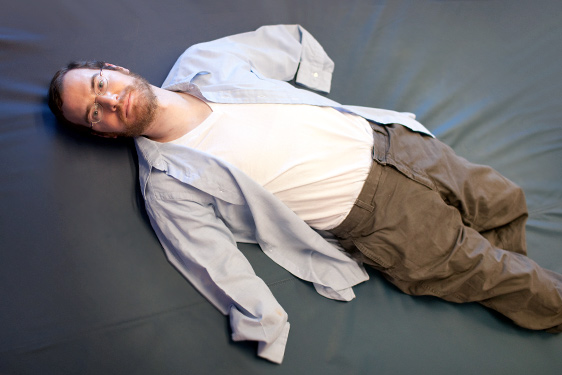
Lautzenheiser taught his first class at Montana State University on Wednesday, August 31. “I thought it went really well,” he says. “I was really excited about it. The kids were totally open and very responsive.” But by the next day, he was suffering. The pain in his thigh had become nearly unbearable. When Arnold offered him a ride to Deaconess Hospital on Friday, Lautzenheiser gratefully accepted.
In Billings, the critical care team tested for many possible causes of Lautzenheiser’s illness, and each one came up empty. Then on Tuesday, test results of tissue taken from an abscess on his back came back positive for group A streptococcus. His organ failure, the team realized, was caused by toxic shock syndrome.
Group A streptococcus is a common bacterium that often causes strep throat and impetigo, and very often no illness at all. But if the bacterium finds its way into the blood or the lungs, it can wreak biological havoc. Streptococcal toxic shock syndrome doesn’t just tell vital organs to shut down, it can morph into necrotizing fasciitis, a ghoulish infection that quickly kills muscle, skin, and underlying tissue. The muscle dies and the skin turns blue, then blisters and falls off. As the tissue dies, more toxins enter the blood, which carries them onward, spreading death like fire. The only way to treat the toxic infection is to cut the dead flesh off, wait 24 hours, and look for more.
Once the medical team in Billings knew what they were dealing with, they started Lautzenheiser on clindamycin, a heavy-duty antibiotic that stops the growth of bacteria and also happens to inhibit the production of the flesh-killing toxin. It was, Tom says, a game changer, but it was already late in a deadly game, and the Billings team was not equipped to deal with Lautzenheiser’s increasing tissue damage. If the patient were to live, he would need the kind of emergency treatment available only at the best burn trauma units. The closest one was at University Hospital in Salt Lake City.
The plane left Billings at 3 a.m., with Tom sitting beside his brother while medical assistants pumped breath into the bloated body. When it landed, Tom believed that things were looking up. Lautzenheiser had survived the rigors of a medical flight and was now in the care of a world-class medical team. As they wheeled his brother through the University Hospital emergency department entrance, Tom allowed himself to think for the first time that he was going to live. But the price of survival would be enormous.
Two days after the flight, Lautzenheiser opened his eyes and saw a pleasant, bearded man in medical garb at his bedside. It was Jeffrey Saffle, the director of the hospital’s burn center and a professor of surgery at the University of Utah.
“We knew he was coming,” says Saffle, who in 25 years at the burn center had treated more than a dozen other patients with necrotizing fasciitis. “We were told about him the night before, and we were waiting for him, but by the time he got here his condition had developed into full necrosis.”
Several days later, Saffle explained the situation to him. The infection that had stopped his kidneys and lungs was under control, but the damage to the tissues of his arms and legs could not be mitigated. His limbs were necrotic, and if he wanted to live, they would have to be removed. Saffle then unwrapped his hands and feet. “They were black like charcoal,” says Lautzenheiser. “I couldn’t feel them. I couldn’t move them. Dr. Saffle said, ‘What do you think?’ It was horrifying, but what could I do? Absolutely nothing except say yes.”
Saffle recalls that Lautzenheiser was “realistic about his options,” options that were, he says, “devastating.”
As the dead areas on Lautzenheiser’s body became more demarcated, Saffle made plans for surgery, trying, as always, to be as conservative as possible.
“We wanted to save at least one elbow and both knees,” Saffle says. “It’s much easier to walk with a prosthesis if you have a knee.”
Dido and Aeneas and RoboCop
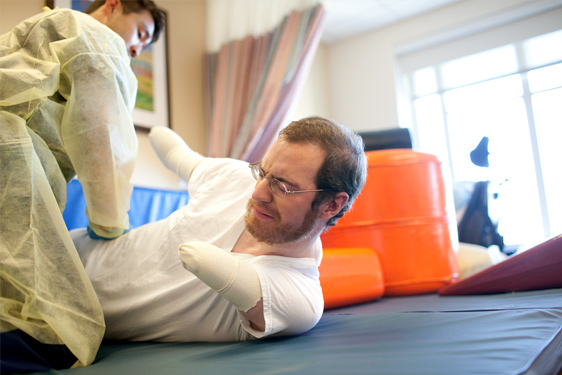
On September 13, Lautzenheiser’s legs were amputated below the knee. Six days later, his left arm was taken above the elbow, and his right arm below the elbow. His body was operated on 15 times, for amputations, skin grafts, and for patellectomies, the removal of his kneecaps. Then, weeks after the first amputations, Lautzenheiser’s left knee, spared in the original cuts, was deemed dangerously necrotic, as the joint deteriorated after the patellectomy. It too had to go. When Lautzenheiser finally looked at his legs, he cried.
Through the days and night of his surgeries, Lautzenheiser says, he dwelled in a dark dreamland that now seems like a horror film shot through gauze. The sound is bad. The lighting is spotty. He remembers nurses in his room, but the nurses aren’t fully human; they are robot nurses, or sometimes half robot and half human. He is wary of the nurses, but sometimes feels sorry for them when they seem sad. He can usually control them with his thoughts, and he has a couple of tricks he uses when he wants to elude them. One tactic involves switching from the year 2011, when he has no hands, to 2028, when he does have hands. He can do that simply by willing it, and although he isn’t sure how it works, he knows that it keeps him from present danger. Ultimately, he says, he chose to stay in 2011, because even in his dream state, he knew that was what he had to do.
As he drifted back toward reality, Lautzenheiser recalls, the journey was shaped by books he had read and movies he had seen, including several narratives about the reconstruction of human bodies.
“Some were ghastly,” he says. “They were ghoulish. Frankenstein was one. There was RoboCop and there were others dealing with disfigurement, dismemberment, and reassembly. I kept thinking, there’s a line in RoboCop: ‘They can fix anything these days.’”
Music too, he says, was a beacon of restoration. He remembers waking from unsettled sleep with a craving to hear Henry Purcell’s Dido and Aeneas.
“What got me through some of my more woeful time was art,” he says. “Even as I was trying to make sense of everything, it was film, literature, and even music in my mind.”
When he finally did reenter the world, Lautzenheiser says, one thing was clear. “I just kept saying, ‘I want to live, I want to live.’ There didn’t seem to be another choice that had to be made. And once I made that choice, everything else flowed from it. I had to get better. I had to fight to hold onto whatever I had. I was going to throw myself into physical therapy. I resolved to be the best patient I could possibly be. Of course, that has been hard. The main difficulty is emotional. It’s difficult for me to look around and see that my life isn’t going the way I expected it to go. But once that first decision was made, everything else was simple. I just had to live.”
When Tom left Salt Lake City in mid-October, their sister Mary flew out from New Jersey, starting a chain of visitors, family, and friends. His parents begged to come, but Lautzenheiser insisted that they stay in Boston. Based on the medical team’s hopeful estimates, he told them he would be home soon, perhaps by Thanksgiving. Then he told them he could be home for Christmas. His real goal, he says, the one date he cared most about coming home for, was his mother’s birthday, January 28.
On January 25, after 140 days at University Hospital, where the staff had showered him with affection, Lautzenheiser was taken to a medical charter plane and flown east. He landed at Hanscom Field in Bedford, Mass., and was brought by ambulance to the 12-bed rehabilitation unit at Boston Medical Center. His days at BMC started with three hours of physical therapy, often grueling and often painful. He did stomach crunches until he could do no more; his therapists would forcibly bend his right knee until the pain was unbearable.
For days, Lautzenheiser dwelled in a terrifying dreamland. There were nurses in his room, but they weren’t fully human. They were half human and half robot. He had a few tricks to elude them.
But by late afternoon, his hospital room would often become a salon, filled with friends, former classmates, and professors like Gerald Fitzgerald, extolling the wisdom of Graham Greene and wondering if Helen Mirren was really suited to play the role of Ida in the remake of Greene’s Brighton Rock.
“I’m happiest when it’s like that,” says Lautzenheiser. “When people come to socialize and talk about whatever strikes them as interesting, whether it’s art or science. I do wish I could be a better host.”
On Friday, April 6, Lautzenheiser took his hosting talents to a podium at BU’s George Sherman Union auditorium, where friends from COM had arranged a benefit screening of the film Septien. As thoughtful and articulate as he had been in the classrooms of COM, he interviewed Septien director Michael Tully about his disturbing narrative of family strife, Jesus freaks, and Satan worshippers. The event raised more than $4,500.
Four days later, he left Boston Medical Center, whose rehab unit is scheduled to close in July, and moved to Spaulding Rehabilitation Hospital in Boston, where his fifth-floor room looks out over the majestically splayed cables of the Zakim Bridge. There, his daily routines continue. In addition to strength training, Lautzenheiser must master the essential tasks of daily living using a new prosthetic arm. He is moving, he says, one step closer to living without hands in what he now regards as “the handed world.”
There are days in his new life when the future looks as dizzying as the past. One of them came in early March, when he was invited to meet with doctors from the Brigham and Women’s Hospital organ and limb transplant team, the group that three years ago performed the second face transplant in the United States and last fall did a double hand transplant on a quadruple amputee. The recipient of the hands, like Lautzenheiser, had lost his arms and legs after contracting sepsis.
“When they suggested that I was a candidate for transplants, I think I stopped breathing for a moment,” says Lautzenheiser. “They’re talking about a double arm transplant and a double leg transplant. I’ve recently lost my limbs and I’m still coming to terms with that loss. I’ve been trying to work with prostheses for my upper body, and I can work with prostheses for the rest of my life. That’s one possibility. What they’re saying represents another possibility, of actually regaining sensation, of actually having the ability to hold something, of being able to feel water, to feel anything. It may not be a 100 percent gain. It may be a 50 percent gain, but a 50 percent gain is better than no gain, and an elbow is better than no elbow. A knee is better than no knee.”
There is, of course, an immense biological liability that comes with all transplants: the likelihood that the host body will reject the newcomer. For that reason, all recipients of transplants live their lives under the influence of powerful immunosuppressants.
“I know that my life expectancy is reduced just by being a quadrilateral amputee,” says Lautzenheiser. “How does the immunosuppressant problem alter that? I don’t know.”
There is, however, one possible exception to the immunosuppressant rule. Will’s body would be much less likely to reject a limb from someone with the same genetic foundation, someone who is an identical twin.
“I can’t even think about that,” says Lautzenheiser. “I can’t go there.”
Tom could not help but think about it. Back in Billings, when his brother’s kidneys were shut down, he was ready to offer one of his. And in Salt Lake City, when the surgeries required extensive skin grafts, Tom approached doctors to ask if they would consider taking some of his.
“Because I would be willing to donate an organ,” Tom says, “of course I thought about what the limit might be: would I give Will an arm or a leg? My wife is an insightful woman, and a couple of months ago she asked me if this is something I was thinking about. When I told her it had crossed my mind, she told me in no uncertain terms that it was a crazy idea. Will, too, would categorically refuse even if it were a possibility. Too many shades of Shelley and Poe.”
There is another, bigger, and unselfish reason that Lautzenheiser contemplates his candidacy for a double arm and double leg transplant: it takes medical science to a place it has never been. “This is the bleeding edge of medicine,” he says. “So of course I’m terrified. I’d be a guinea pig. But on the other hand, maybe I owe this opportunity to science. It makes me ask, ‘What are my values? What are my beliefs?’ Maybe I owe it to society to say yes.”
In the hospital in Salt Lake City, Lautzenheiser was working with two prosthetic arms, and he was doing well. He could push a wheelchair. He could feed himself. He even learned to write, curiously with his right arm, even though he had always been lefthanded. He was pleased with that. He was proud of his dexterity, and he was impressed with the power he felt, setting words down on paper.
The first thing of any length that he chose to set down on paper were words that as a student in CAS years earlier had moved him profoundly. With his mechanical hook, he carefully scripted the first lines of John Milton’s Paradise Lost:
Of Man’s First Disobedience, and the Fruit
Of that Forbidden Tree, whose mortal taste
Brought Death into the World, and all our woe,
With loss of Eden, till one greater Man
Restore us, and regain the blissful Seat. ■
Donations to benefit Lautzenheiser can be made online at http://lautzenheiserfund.wordpress.com/donate/.





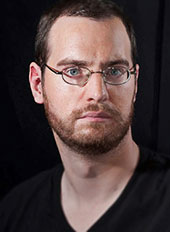
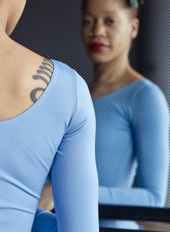
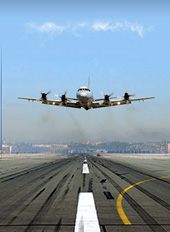
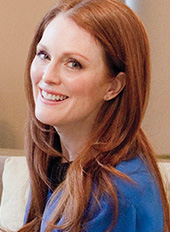
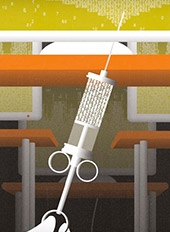

 Twitter
Twitter Facebook
Facebook
Comments
On 10 July 2014 at 1:59 PM, Jane wrote:
What an amazing story! I just listened on NPR Here and Now! You are an amazing guy! Wishing you all the best!
On 5 September 2012 at 12:36 PM, Chris Messina wrote:
Just wanted to let you know I was thinking of you. Your courage and determination are certainly inspiring. Thanks for sharing your story. Wishing you the best.
On 31 July 2012 at 5:39 PM, Sally Dalton (SAR’67) wrote:
Will, your zest for life and your determination to work hard to accomplish all that you can is exciting. You have so much to teach the rest of us. Yes, you are still an educator. It is still all there in your head and in your heart. Bless you!
On 29 July 2012 at 11:19 PM, Ordany Robles (CAS) wrote:
Hey Will, I don't know if you are able to read these comments or not. i just wanted to let you know that you are a great inspiration. thank you for sharing your story, i hope everything goes well in your life. Always keep your head up ! i wish you nothing but the best.
On 27 July 2012 at 3:37 PM, Eunique wrote:
I am so inspired by this story! you never know where life will take you so u have to be ready and Will you were ready! Thank you so much for sharing and I pray many blessings for you and your family!
On 23 July 2012 at 11:48 AM, Dr. Gerard Scarano (CAS’85/95) wrote:
Will remains an inspiration to us all. I fell 74 ' in a climbing accident in Utah. I was told I'd never walk or do lots of things I still do today. In fact, 9 spinal fusions later I walk, run (slowly) and dance. Yes, I still do lots of other things (as often as I can). Today my challenge is insulanoma, not unlike Will, I remain determined to be the pioneer survivor. We need more Wills and Will needs more of us.
On 18 July 2012 at 5:41 PM, Eric Peloquin wrote:
What a great article and video! I couldn't be prouder to know you, Will.
On 18 July 2012 at 10:12 AM, Hala (MED/BUSM’12) wrote:
Thank you for sharing your inspiring story.
On 17 July 2012 at 3:57 PM, Kim Santo (CAS’00) wrote:
Hi Will - It's been a long time. I just wanted to drop you a line to let you know that I'm thinking of you.
On 16 July 2012 at 4:09 PM, Andre De Rezende wrote:
Please watch some videos about this guy: Nick Vujicic
On 16 July 2012 at 10:43 AM, Robin B. wrote:
Will, thanks for letting us share your story. I have learned a lot collaborating with you, and really enjoyed the time we've spent together. Many people have commented to me about your strength, and are interested in your progress. If you have a chance to post an update, I know they would appreciate it.
On 16 July 2012 at 10:23 AM, Caleb D. wrote:
Powerful and inspiring tale. You clearly are in possession of everything that matters. Thanks for sharing your story!
On 15 July 2012 at 4:47 PM, Vincent Tamuzza wrote:
We can never be sure of what we are capable of, until we are actually faced with the hypothetical situation that has now become reality. Of course, there are times of pain, fatigue, and despair that seem endless, but their intensity wax and wane. Sometimes people can't fathom how the sick or injured carry on, but there isn't much choice; either you give up, or you make the choices that will help you survive, and eventually thrive. Will seems to have been an amazing person before his illness, so there is no doubt that his spirit will continue to shine just as brightly during his recovery and for years to come. I wish you and you family all the best. I hope to see your progress in the months and years ahead.
On 13 July 2012 at 7:39 AM, Bonnie Britt (CAS’69) wrote:
When I think of Will Lautzenheiser, I will forever think of: Character. Dignity. Eloquence. Generosity. Grace under Pressure. Grit. Hope. Integrity. Intelligence. Strength. Struggle. What it Means to be Human. What it Takes to Prevail.
On 12 July 2012 at 10:57 PM, Lynne wrote:
An amazing story! What inner strength and determination against unbelievable odds.
On 12 July 2012 at 10:06 PM, Val Hamblin wrote:
You are a remarkable man, Will. Inspirational is a hackneyed word but it perfectly describes your gripping story. I'm impressed by your total lack of self-pity and wish you all the best for the next stage in your treatment.
On 12 July 2012 at 8:39 PM, Christine Vielmetti wrote:
An inspiration and example of incredible strength. Thank you for sharing your story!
On 12 July 2012 at 12:11 PM, Kelly Marksbury wrote:
Amazing story about an amazing member of the Boston University community. I'm proud to be associated with Will by way of BU.
On 12 July 2012 at 9:01 AM, Chris wrote:
Amazing! Will, thank you for sharing your story here, which surely has many more incredible chapters ahead. I wish you and your family all the best.
On 11 July 2012 at 2:41 PM, Meghan wrote:
Very remarkable story. Thanks for sharing.
On 11 July 2012 at 2:10 PM, Ryan Bogard wrote:
An amazing story about an exceptional person. Extraordinary courage doesn't go unrewarded and he is deserving of much! Indeed, he is an inspiration to us all!
On 11 July 2012 at 1:37 PM, Jessica LaCount (GRS'09) wrote:
I'm amazed and humbled by your grace, wisdom, and perspective, Will. I have no doubt that you'll be a tremendous success at whatever you do next.
On 11 July 2012 at 9:42 AM, Emma Brady wrote:
This is a wonderful feature. I feel honored to know Will personally. The teacher in him seems to be forever ingrained as every interaction we had was a learning experience for me. I wish him all the best with his future endeavors. I know we will be hearing great things from Will very soon.
On 10 July 2012 at 2:04 PM, Russell Cobb (SED'96) wrote:
Thank you for this story. And thank you for having the best alumni magazine and website in the world, hands down.
On 2 July 2012 at 9:03 PM, Alex Zeuli (SAR'85) wrote:
What incredible strength - strength of character, courage and gratitude for life. Now that is a man that I would love to meet and have a conversation with. Thank you for sharing this story. I am counting on some updates through some public forum like Bostonia.
On 29 June 2012 at 6:22 AM, Robert Copeland (CLA'78) wrote:
All the best on the long road ahead. Don't know you at all but I'm guessing you'll do just fine.
On 28 June 2012 at 3:25 PM, Katherine Austin (CFA'75) wrote:
Thank you so much for sharing your story. You are an inspiration. I wish you all the best in the world.
Post Your Comment